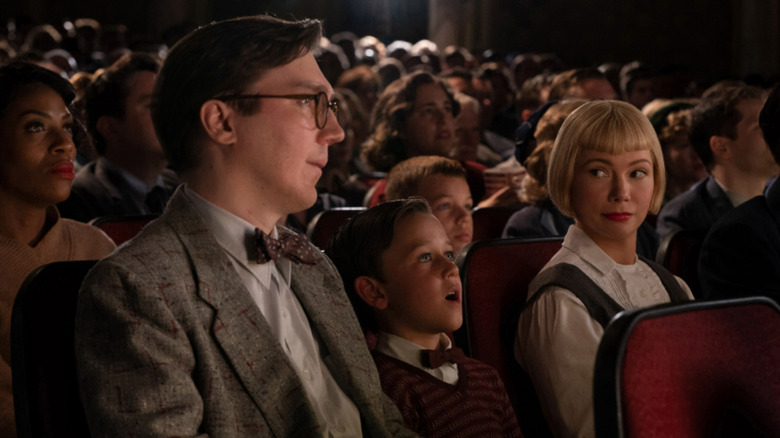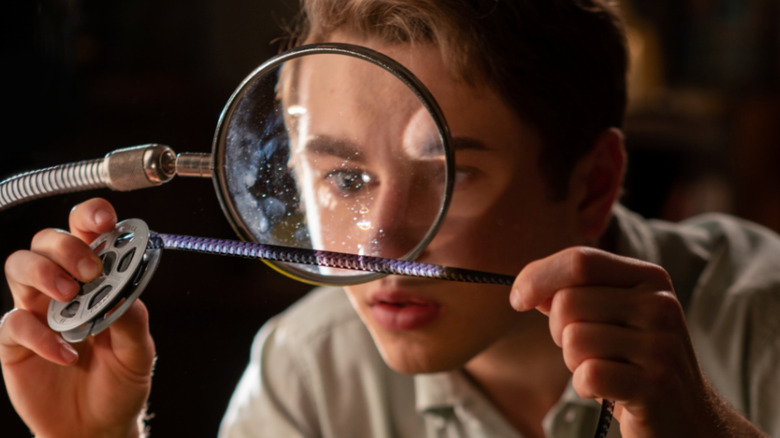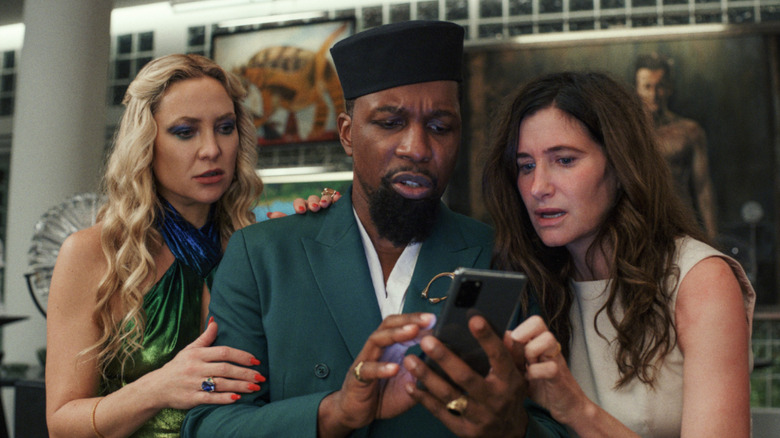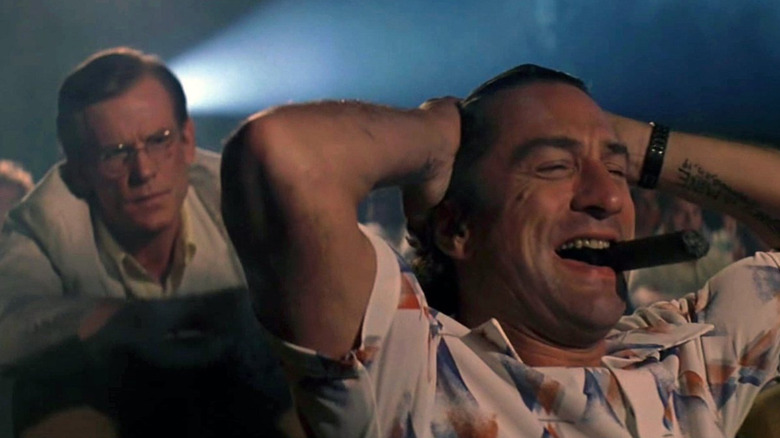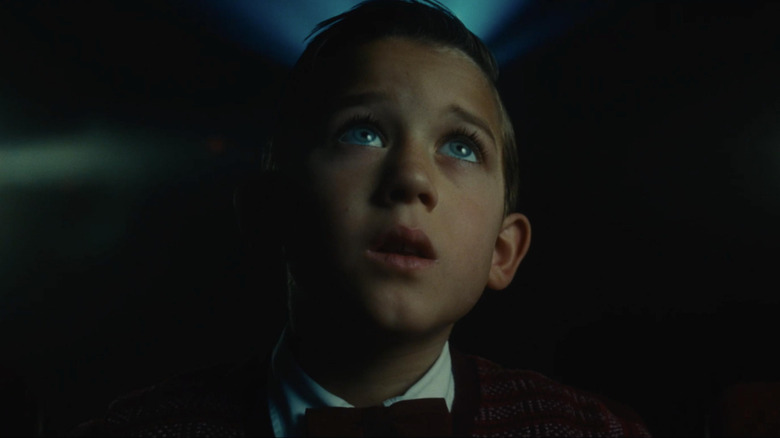Steven Spielberg Is Right About Theaters Versus Streaming
When I visited the Toronto International Film Festival earlier this year, one of the films I was committed to getting into was "The Fabelmans." It felt like a once-in-a-lifetime opportunity — when else will I be able to sit in the same room as a titan of filmmaking like Steven Spielberg? I didn't care that I would probably be seated far away from him. Just watching one of his movies with him in attendance would be a dream come true.
Thankfully, I was able to attend the world premiere. When I was eventually able to sit down in my seat, I felt completely immersed in the life of aspiring filmmaker Sammy (Gabriel LaBelle). Its two-hour and thirty-minute runtime flew by like it was only two minutes and thirty seconds. Although I risk sounding corny, it was like I was taken out of the Princess of Wales Theatre and into the home and lives of the Fabelman family.
For the most part, this is exactly the type of feeling I get any time I'm able to go to the movies, and it's a feeling that simply cannot be replicated on streaming services. According to a new interview with The New York Times, Spielberg agrees, comparing "the magic of being in a social situation with a bunch of strangers" to a tonic, and he's right. While his viewpoint could be a bit naive at times, he's still right in saying that theaters should still remain the most important way to watch a movie.
What the legend has to say
Spielberg recognizes that the rise of streaming over theatrical releases is not a new phenomenon. He said that it mirrors television's rise in the late 1950s and early 1960s, specifically how NBC created the "Saturday Night at the Movies" program.
"You could stay home and watch television because NBC was designing films especially for audiences that didn't want to leave the house," he recalled. "This is nothing new."
Spielberg himself isn't immune to considering streaming releases, but it has to be carefully planned out and negotiated. He says in the interview that a movie like 2017's "The Post" could have been released on either Apple or Netflix if it were made today due to the streamers' accessibility.
"The film had something to say to millions of people, and we were never going to get those millions of people into enough theaters to make that kind of difference," he said. "Things have changed enough to get me to say that to you."
However, that doesn't necessarily mean he's all-in on streaming. Far from it, in fact. Spielberg recognized the importance of them during the COVID-19 pandemic but said he felt that his fellow filmmakers were robbed of their chance for a proper theatrical release. In order to curb this, he suggested "a concerted effort" by directors, unions, and studios to make the synergy between theatrical and streaming releases work for everyone.
"It's going to have to come from all of us," he said, "the WGA, the DGA, and eventually the Academy."
There's a clear difference between streaming movies and theatrical movies
The fact of the matter is that watching a movie on streaming feels very different from watching a movie in a theater. This is not to say that this is always a bad thing; movies such as "Do Revenge" and "Weird: The Al Yankovic Story" are perfect for streaming due to their casual nature. These films don't necessarily set out to immerse you in an intricate story, but rather, they just want the viewer to kick back and relax with the movie.
However, releasing movies such as "Glass Onion: A Knives Out Mystery" and (in the case of HBO Max's pandemic-induced schedule of 2021) "Dune" on streaming feels like a slap in the face to the moviegoing experience. These types of stories are those that demand the audience's full attention. They are crafted specifically to do just this, from the cinematography to the sound design and everything in-between. That's why the sound systems in theaters reverberate through your body in a way that even the best home sound system can't replicate. This immersion is ultimately lost when a movie hits streaming.
What makes the theater experience so important is that it isn't just about seeing movies on a big screen. The theater experience is all about losing yourself in a story for an hour or two, taking you out of your normal life and placing you in a new one. If we lose this to cheap streaming alternatives, we're losing the ultimate form of escapism.
An imperfect system
This isn't to say that the theatrical experience has absolutely no flaws, because I know very intimately that this isn't the case. I grew up in a small-ish Florida town that only ever had up to three operating theaters at a time. Two of these exclusively played blockbusters and other major studio releases (with a couple of faith-based movies like "God's Not Dead" thrown in for good measure), while a few different discount theaters opened and closed throughout the years. The home video market quickly dried up, and if you wanted to watch anything made by anyone other than biggest studios, you'd have to drive to the next city over. In some cases, buzzy independent movies weren't available to watch anywhere throughout the state. And let's not get started on the very real issues of extremely overpriced concessions, dwindling staff members, and the occasional obnoxious crowd.
Needless to say, I understand why some people currently prefer straight-to-streaming releases over theatrical ones. There are people out there who just can't afford to go to the movies, or they are locked out from seeing movies that aren't the standard Hollywood fare. I'm in the exact same boat. However, the response to this shouldn't be to ignore or degrade the theater-going experience. It should be to advocate for better access, better employee treatment, and fair pricing. Things you love are worth fixing, and in the case of movie theaters, they deserve to be preserved while also improving from their flaws.
Movies are dreams that you never forget
When the end credits to "The Fabelmans" began to roll on its premiere night, I felt like I had just crashed down to earth after flying through the skies. However, I wasn't sad that the movie had ended. Rather, I was happy that I got to immerse myself in it in the first place. Based on the electric feeling in the rest of the theater, other audience members felt the same way I did.
It was that moment, hearing people clap and cheer for a movie in a massive two-thousand-seat theater, where it really clicked for me how much I love the movie-going experience. Even with its capitalism-induced flaws, there needs to be an avenue where people can go and ignore the real world for a couple of hours. Streaming services cannot replicate that, no matter how hard they try. Theaters and streaming services can co-exist, but the current state of things has created a stranglehold on the theatrical experience. Movie theaters are the best way to watch movies when the experience is done right, but that simply isn't the case many multiplexes.
Spielberg is not the only director to criticize streaming services, and he certainly won't be the last. There are a lot of factors that his criticisms seem to ignore, but when you get to the root of his remarks, they are undeniably true. The immersiveness of theaters is just too precious to go to waste, and both the artform and we as viewers will be worse off without it.
